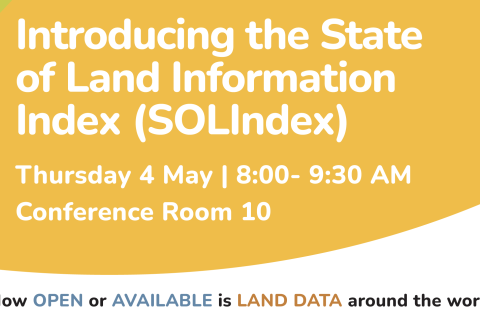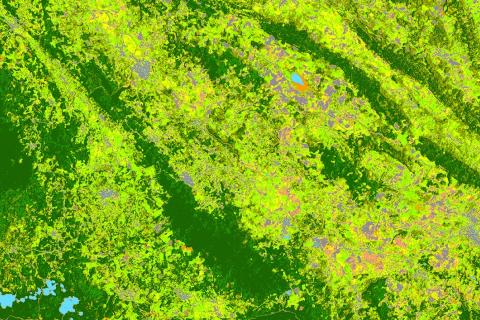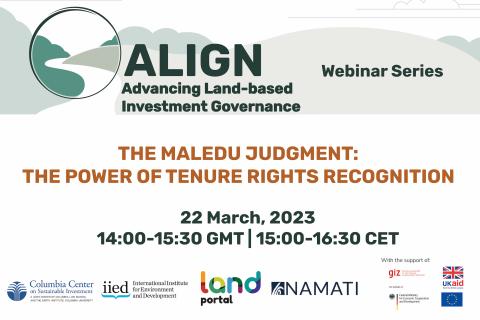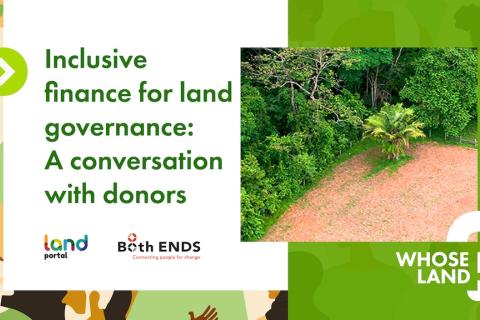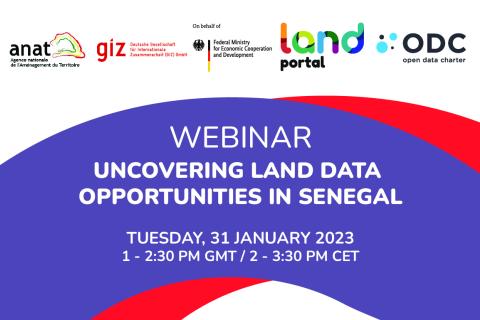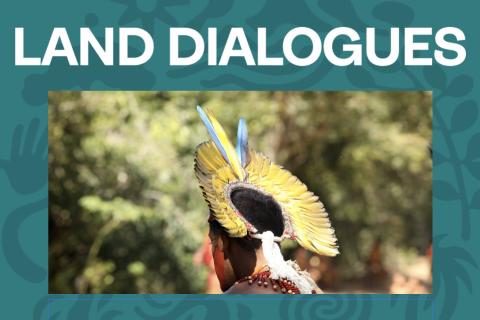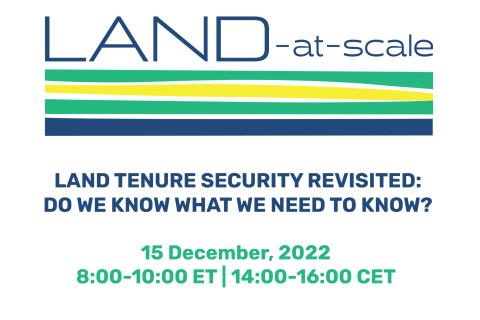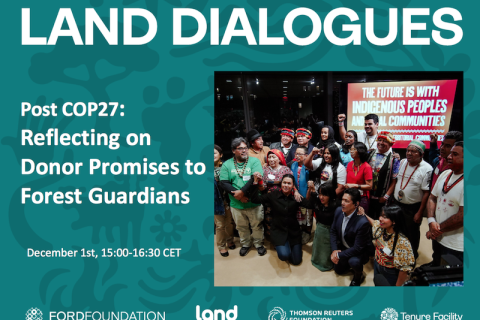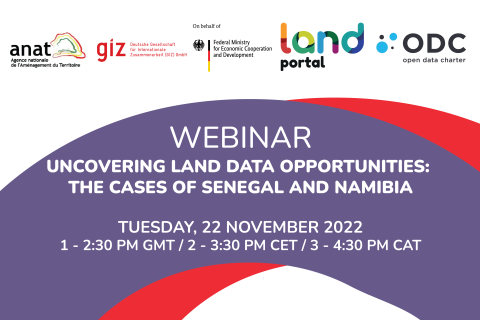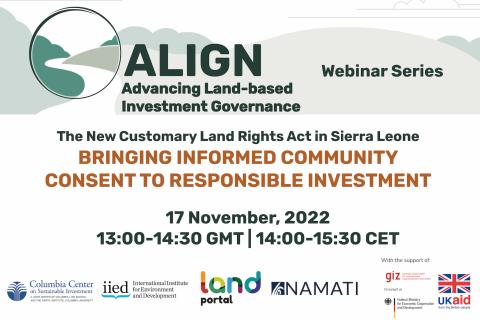Introducing the State of Land Information Index
This side event will serve to introduce the Land Portal’s State of Land Information Index (SOLIndex), which measures openness of land data at the country and global level. The aim of this index is to make land-related findings more actionable and to complement existing land governance monitoring systems, such as tools developed by GLTN. The SOLIndex provides an overall indicator that assesses the openness of land data and information at global and country levels. The SOLIndex can be used as a diagnostic and advocacy tool for making land data more open and inclusive in support of good land governance.
This side event will explore the range of indicators that constitute the index, explore strengths, weaknesses, opportunities and threats of the collection of these indicators in an effort to obtain and incorporate feedback from GLTN Partners into the process of validating the indicator.
Through the Land Data Lens – What are we seeing/Not seeing?
The objectives of this session are to highlight national, regional and global progress and accomplishments in outcome 3 of phase 3 of the GLTN program, to gather feedback from GLTN partners and receive proposals on the monitoring focus in phase 4, and to identify potential collaborative opportunities with GLTN partners to upscale monitoring of the land agenda.
Taking Data Back: Women’s Sovereignty over Land Data
The theme for this year’s International Women’s Day is “DigitALL: Innovation and technology for gender equality”. The day aims to celebrate women and girls who are championing the advancement of transformative technology and digital education. It will also explore the impact of the digital gender gap on widening economic and social inequalities.
The Maledu Judgment: The power of tenure rights recognition
This webinar discussed the implications of the Maledu judgment, the importance of recognizing and protecting informal land rights, the power of access to information and the positive outcomes tenure security can have for mining-affected communities. It will look at the impacts of the judgment for the community and explore how the community members have engaged with the mining company.
Inclusive finance for land governance: A conversation with donors
The webinar will: hear from donors about their experience and challenges in making grants more inclusive; give insights in measuring inclusiveness; and ask and discuss questions on how donors can use data-driven information to inform their decisions in financing land governance investments.
Uncovering Land Data Opportunities in Senegal
The momentum is increasing around international land monitoring initiatives, together with an unprecedented demand for free, accessible, and usable land data and information. The land sector must find ways to seize opportunities presented by open data innovations while negotiating a rapidly changing data environment.
The Land Portal and Open Data Charter have been working with the Government of Senegal to open up land data, following the guidance set forth in the Open Up Guide for Land Governance. The Open Up Guide is a practical guide for governments who are seeking to better collect, publish, and use land data for the public good. As Phase 1 of this project, the team has published the State of Land Information in Senegal (SOLI) Report. SOLI reports are research-driven analyses of the current state of land data that assess the available land information against open data standards.
The webinar will:
-
Share latest results from the Open Up Guide implementation pilot in Senegal and findings from the SOLI Senegal report
-
Ask and discuss questions concerning the interest in and maturity of open data in Senegal as it relates to land
-
Hear perspectives from the government of Senegal (ANAT, PROCASEF), donors (GIZ, World Bank), local community members, using specific case studies on data and land initiatives
Land Dialogues Webinar Series 2023
One of the main aims of the Land Dialogues series is and has been to highlight Indigenous knowledge and wisdom as a solution to pressing global challenges. The series does so by creating a virtual space that bridges that gap, where the term “expert” is not limited to academics or researchers, in an effort to both decolonize and democratize knowledge. In particular, the Land Portal’s role is to highlight Indigenous Peoples’ need for agency and control over the data that is about them, recognizing that data can either amplify equality or exacerbate unequal power structures.
Land Dialogues Webinar Series 2022
In 2022 we remain in the midst of a once-in-a-century pandemic, increasingly violent weather events connected to the changing climate, and global security tensions due to war and conflict. Indigenous Peoples and local communities (IPLCs) are among the most vulnerable and are both directly and indirectly hard-hit by these events.
Land tenure security revisited: Do we know what we need to know?
Strengthening security of tenure is considered a key outcome of the LAND-at-scale program as a pre-condition to improved livelihoods, resilience, and sustainable resource use. LAND-at-scale interventions employ a range of tools to achieve tenure security, in particular land mapping and registration. Despite the popularity of such interventions, the assumptions underpinning the impact pathways from registration to tenure security and derived outcomes such as improved livelihoods are not always built on a solid evidence base.
Post COP27: Reflecting on Donor Promises to Forest Guardians
This final webinar of the Land Dialogues 2022 series, will take place after the UN Climate Change Conference COP 27 (6 – 18 November, Sharm El-Sheik). With a historic 1.7 billion dollar pledge having been made at last year’s COP26 by the Forest Tenure Funders Group to advance Indigenous Peoples’ and Local Communities’ tenure rights and their forest guardianship, it is important that we discuss challenges and opportunities in the context of these important advancements. The “Post COP27: Reflecting on Donor Promises to Forest Guardians” webinar will serve as a platform to reflect on progress made, what is falling short and if the 1.7 billion dollar pledge made during COP26 was reflected during COP27.
Uncovering Land Data Opportunities: The Cases of Senegal and Namibia
The webinar will share the latest results from the Open Up Guide implementation pilot in Senegal and the SOLI research in Namibia. We will ask and answer pressing questions concerning the interest in and maturity of open data in the two countries and specifically in the land sector.
The New Customary Land Rights Act in Sierra Leone: Bringing informed community consent to responsible investment
In September 2022, Sierra Leone enacted unprecedented laws related to land, climate, and sustainable development. This new law transforms communities’ ability to protect their land rights and pursue sustainable development. This webinar will discuss the processes, the experiences, the challenges, and the context of this new law, highlighting the new responsibilities in Sierra Leone.

